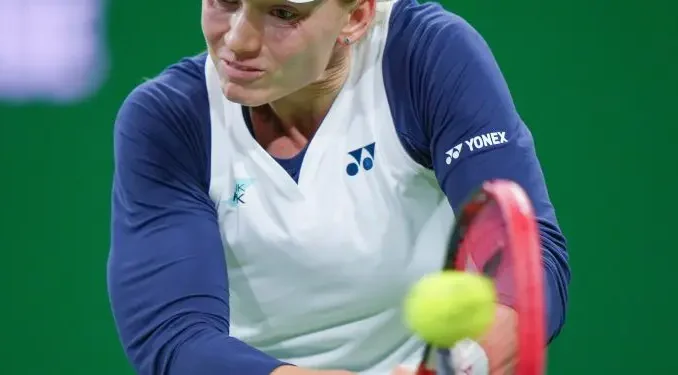
In the high-octane world of professional tennis, where every swing carries the weight of legacy and lucre, a stunning twist has emerged from the ranks of the elite. Elena Rybakina, the towering Kazakhstani star and former Wimbledon champion, has sent shockwaves through the sport by standing alone against a groundbreaking pact aimed at reshaping Grand Slam prize money. As of April 5, 2025, the tennis community is abuzz with the revelation that Rybakina, ranked among the world’s top players, is the sole holdout among the top 20 ATP and WTA stars who signed a bold letter demanding fairer financial stakes and greater player influence at the sport’s most prestigious tournaments.
The letter, a collective cry from tennis’s brightest lights, was no small gesture. Penned by the top 10 men and top 11 women—minus one conspicuous absence—it landed in the inboxes of the four Grand Slam chiefs with a clear message: the players want more. More money, yes, but also more say in the decisions that shape their careers and well-being. “Prize money should increase to a more appropriate percentage of tournament revenues, reflective of the players’ contribution to tournament value,” the players argued, their words a rallying call for equity in a sport where gate receipts and TV deals rake in billions. They didn’t stop there, pushing for financial contributions to player welfare programs and a stronger voice in competition rules and health policies. It was a unified front—almost.
Enter Rybakina, the 25-year-old powerhouse whose serve can silence a stadium and whose resolve now has the tennis world whispering. Alone among her peers, she declined to put her name to the pact, a decision that’s left fans and insiders scrambling for answers. “Wondering why?” one observer mused, capturing the curiosity that’s rippling through locker rooms and social media alike. Theories abound, with some pointing to her tumultuous 2025 season off the court. Her coaching saga—marked by a split from longtime mentor Stefano Vukov, his controversial ban, and a brief stint with Goran Ivanisevic—has kept her in headlines as much as her forehands. Could this be a deliberate step back from the fray, a refusal to engage in yet another battle?
Rybakina’s journey to this moment has been anything but ordinary. Born in Moscow and now a flagbearer for Kazakhstan, she stormed to prominence with her 2022 Wimbledon triumph, a victory that showcased her icy composure and thunderous game. Since then, she’s added titles and top-10 finishes, but 2025 has tested her mettle. An early exit at the Miami Open, a doping suspension sidelining her until May, and the Vukov drama have painted a picture of a player at a crossroads. Yet, her silence on the prize money letter speaks volumes. “She’s always been her own person,” a fellow player noted, hinting at a fiercely independent streak that might explain her lone stance.
The implications of her refusal ripple far beyond her own camp. The pact, backed by stars like Novak Djokovic, Iga Swiatek, and Carlos Alcaraz, represents a seismic push against the Grand Slams’ financial status quo—where players reportedly earn just 12-15% of revenues, compared to over 50% in sports like the NBA. For Rybakina to opt out suggests either a philosophical divide or a personal calculation. Some speculate her agent shake-up—she’s reportedly parted ways with her management, with Vukov stepping into that role—left her out of the loop. “Maybe she couldn’t be contacted,” one theory floated, tying her absence to logistical chaos rather than defiance.
On the court, Rybakina remains a force, her 6-foot frame delivering serves that top 120 mph and groundstrokes that punish opponents. Off it, she’s an enigma, rarely one for grand statements. Her peers, meanwhile, are vocal. “Finally the athletes should have more say in decisions directly impacting competition, as well as player health and welfare,” the letter insisted, a sentiment echoed by players who’ve long felt like cogs in a lucrative machine. Rybakina’s refusal doesn’t derail their cause—the signatures of Sabalenka, Gauff, and others carry weight—but it does spotlight her as the outlier in a sport craving unity.
As the tennis season barrels toward the clay courts and beyond, Rybakina’s stand adds a layer of intrigue to an already dramatic year. Will she elaborate on her choice, or let her racquet do the talking when she returns? For now, the lone dissenter stands apart, a quiet rebel in a chorus of change, leaving the tennis world to ponder what drives the woman who said no to a bombshell that could redefine the game.
Leave a Reply